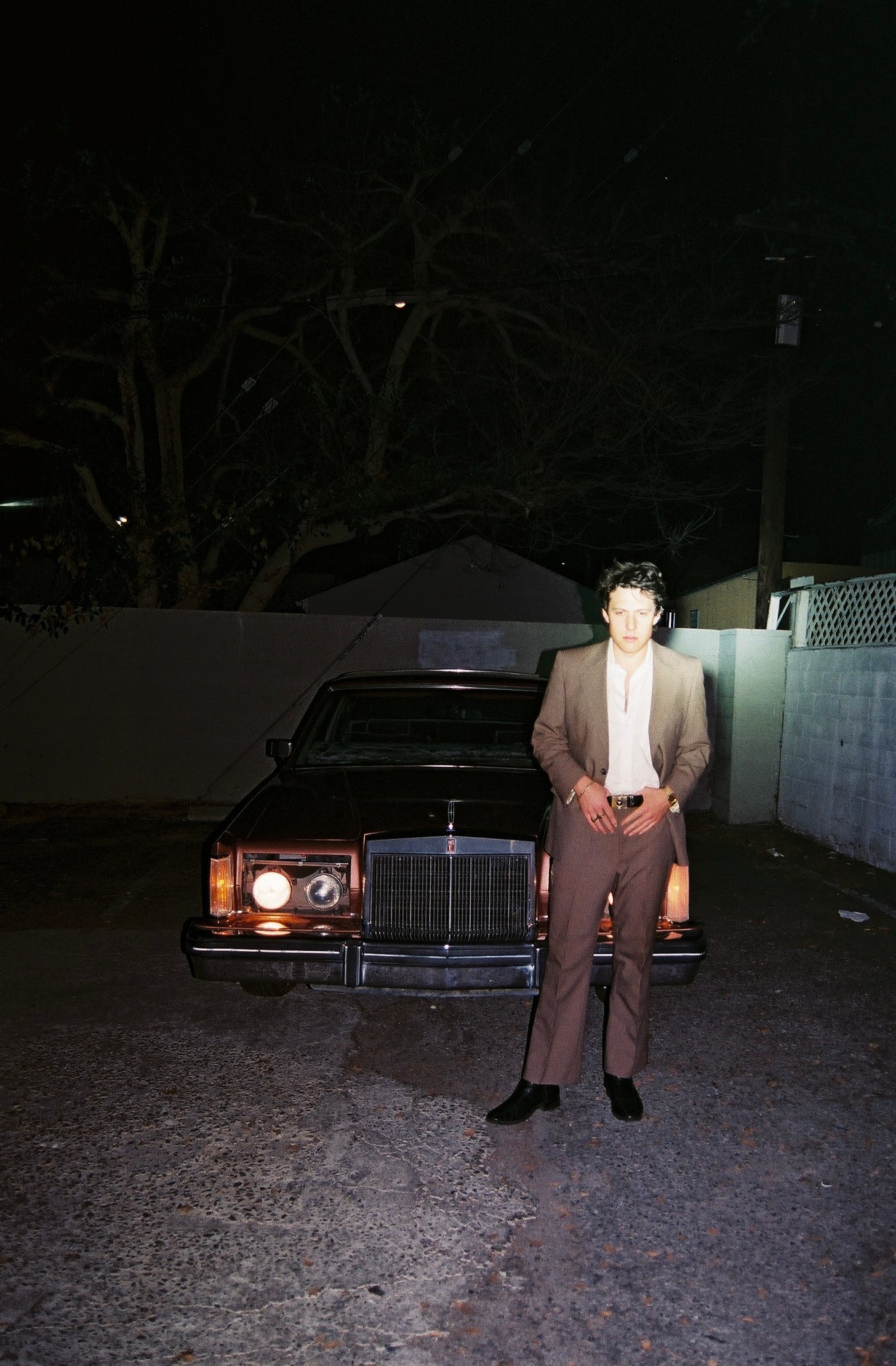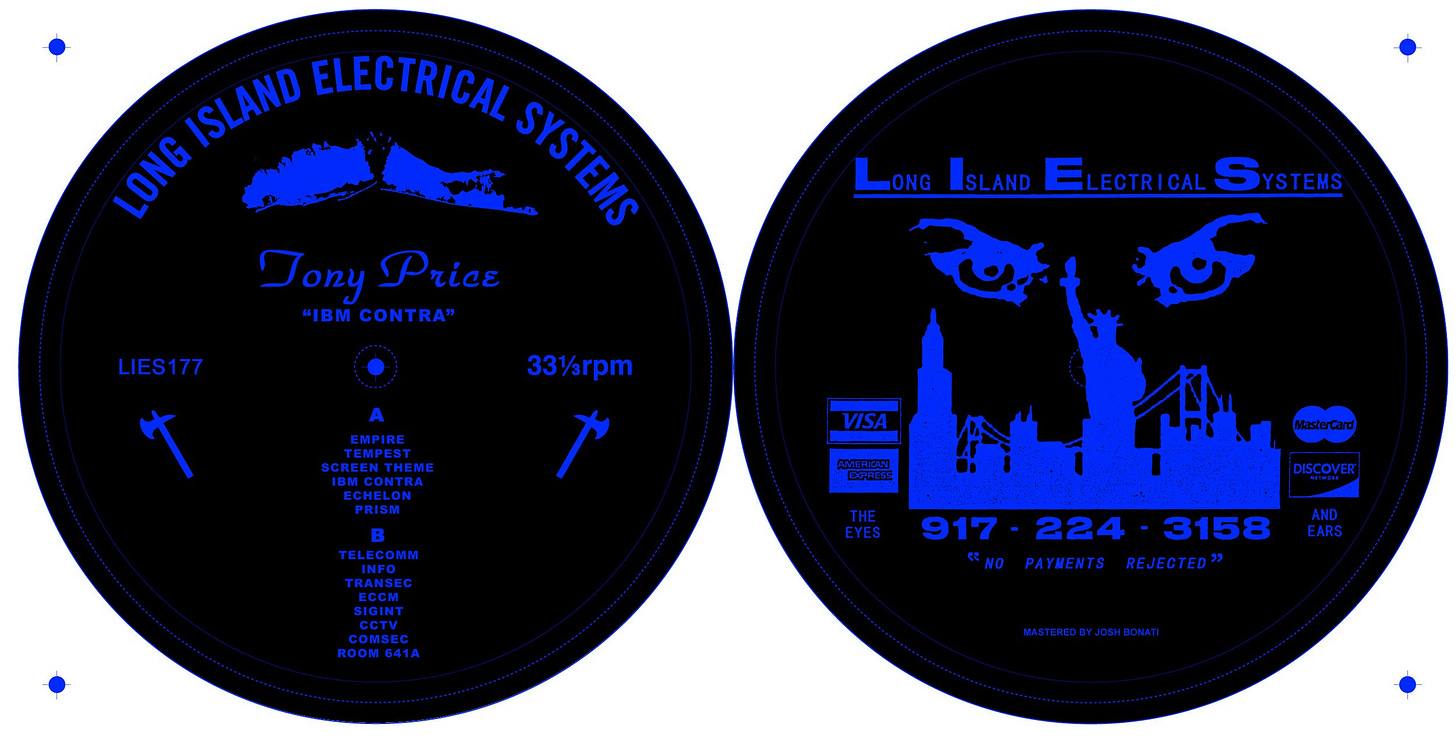Maximum Exposure: Chatting With Tony Price
The Toronto legend speaks on creativity, Instagram DJ's, and good habits.
Tony Price is a music producer, audio engineer, and DJ hailing from Greektown, Toronto. He’s also the creator of MAXIMUM EXPOSURE, a record label and archive focused on 80s and 90s dance music design. We sat down to chat about his musical background, the problems with hustle culture, and going against the “boiler room syndrome” of online DJ culture.
His sixth album, IBM Contra was released on L.I.E.S Records this July.
Matt: You grew up around electronic music and Boogie. How did that impact your outlook on music, and your sound?
Tony: I did grow up around that stuff! My parents often frequented nightclubs in Toronto. This was the eighties, the time that electronic instruments really became accessible to people making music. Being exposed to these sounds at a very young age influenced the way that I hear music. When you're listening to music that's made with sequencers and made with machines, you're hearing precision. You're hearing precise grooves and stuff. You're hearing really sparkling, beautiful frequencies and really menacing, forceful bass. Things that were not necessarily in music before the advent of this technology.
To me, it just doesn't get any better. It's like looking at a beautiful, stunning building made out of glass with crazy angles. It's just astounding, you know? That set the bar really high for me in terms of what I want out of that kind of music.
Matt: So, what was your first foray into music production? Are there any formative moments that for you?
Tony: When I was in middle school, I bought a guitar and took two lessons and I told the guy to fuck off because he was like showing off! He was shredding in front of me and I was just like, No, I'm not paying to watch you pretend to be Steve Vai or something, you know. I realized that I love playing guitar, not because I actually care about the guitar or what it does. I like it because I want to use it as a tool to make songs. Then I started a band and realized that I don't really care about writing songs that much. I only wanted write songs so that I could record them.
Then, I had this really serious moment on my 20th birthday or something. I was lying in bed, stoned out of my mind listening to The Beatles “White Album”. There's a song called “Savoy Truffle” with a snare hit that goes “duh-Guh! duh-Guh!”. I don't know if it was like a double hit on the snare, or if it was an Echoplex or something. I sat there, and I was so transfixed. Why am I so obsessed with this sound and figuring out what this sound is? That's when I realized I'm a music producer. I'm not a musician. I have no interest in being a rock star. I have no interest in touring. I only like listening to recorded music. It's one of those few moments that you have in your life where something's made so clear to you, you know? I was just like, this is what I do. It was like a very beautiful thing.
The Beatles - Savoy Truffle (1968)
Matt: Tell me about your creative process… what does that look like?
Tony: The way that I make music, and always have, is that I become possessed by a concept or an image, and I'll see something in my mind's eye. Some people might call this synesthesia. I don't know if that's a real thing or whatever, but I can definitely say that I'll have a whole concept in my head. I made a record called IBM Contra that came out this year, and that was like a whole image, a whole kind of movie found its way into my head one day a few years ago, and it was this very rainy sort of cybernetic dystopian world, this whole image. I could see images, fonts, I could see everything, but I didn't have any music. So I started making music that kind of fit that image. Then, it would go into that mental folder, and it would also go into a literal folder on my computer.
Matt: Do you think there were any habits that allowed you to hone your skills? Whether it's forcing yourself to make a song every day even if you don't want to, or sequestering time to be like, “Okay, I need to make music now”.
Tony: I don't believe in this sort of hustle culture that is being bestowed upon us. We're being told “if you're not putting in this many hours, just call it quits. If you're not making five beats a day, you're a loser.” I think that that's a very damaging and poisonous facet of music culture and production culture. So if you're asking about any habits, the only thing has been the opposite for me. If you wanna call it a habit, it’s finding a way to “not do”.
What I mean by that is: Creativity is not something that you either have or you don't. It's the base human act. It’s not something that you can spend 10,000 hours getting better at. What it is, is a relationship with that higher power. When it comes to creativity, we're like radios with an antenna. Up there in the ether, there's just this endless ocean of ideas and concepts going back to the beginning of time. They're always there, they've always been there. It's your job as a creative person to use yourself to lock into a station, to accept these set transmissions from wherever to come through you because ideas don't belong to you, They come through you.
All of this poisonous hustle culture stuff creates so much noise in your head that you're unable to receive these signals. I just have to accept that sometimes it's not a day, it's not a week, it's not even a month to make music. Maybe, it's just time to stop and think, listen to music, not listen to music, read a book. When it's time to make you know it, you feel that impulse. It took me a very long time to accept that.
Matt: What kills your flow, and what improves it?
Tony: What kills it is, again, overemphasizing the importance of what you're doing. It's your job to create a situation that is conducive to allowing art, or creativity, or ideas to flow through you. That's why I don't like the idea of having this formal setup where I sit down and get to work. I like to be in a spot where I'm not even thinking, where I'm sitting on the couch, slumped over, watching, I don't know, some old French gangster movie in the corner of my eye and not thinking, because that means that there's less of me. I'm just there doing something and allowing it to flow through me like a conduit. That's what breaks my flow, when I start to think I'm some kind of an important part of this process.
Matt: It seems like every other person you see on social media now is a DJ. What's something that you dislike about the scene at the moment?
Tony: I dislike the entirety of the scene. I hate it all. I don't feel like I fit in, in any regard, into this kind of thing. Again, that's just like my personal insecurities too. I have no problem with every single person on earth having an interest in playing music in a room on loudspeakers. Like, if you're a music fan, why wouldn't you wanna do that? But thinking it's in any way similar to being a recording artist or producer is in my opinion, a mistake because it's not the same thing.
The sort of Boiler Room syndrome of the past decade has given an insane amount of credence to the role of a DJ in music culture and inflated it to this sort of celebrity or influencer type role within music. I don't wanna see a DJ. I don't wanna see their outfit. As a matter of fact, if I'm out DJing, I don't want to be seen. I get anxiety when I feel people are watching me make these faces while I'm trying to fucking queue up records and beat match and stuff. I'm not interested in that. I want to get out there and bring the music that I'm making to dance floors, but do I wanna participate in this culture of being an Instagram DJ? There's no way that I wanna do that.
Matt: What’s something that gives you hope?
Tony: I just think that I have hope because I accept and recognize that this is not in our hands. This is something bigger than us, you know? It'll never stop. It will never ever stop. To create is our act. That's what we're here to do.That's how we have gotten to this point. That's how we exist, why we exist. That's how we've sustained life. Maybe we're quote-unquote destroying ourselves and the planet, that's very possible. But the act of creation sometimes involves destruction. It'll never stop. That's what we're here for, and that's why I can't feel negative about it. I can be miserable and uncomfortable with trends and sounds, and have them not resonate with me. But at the end of the day, it's not even a question of faith in the future because there is no other way. It'll always be here.
Find Tony Price on:
Instagram: @maximumexposure


